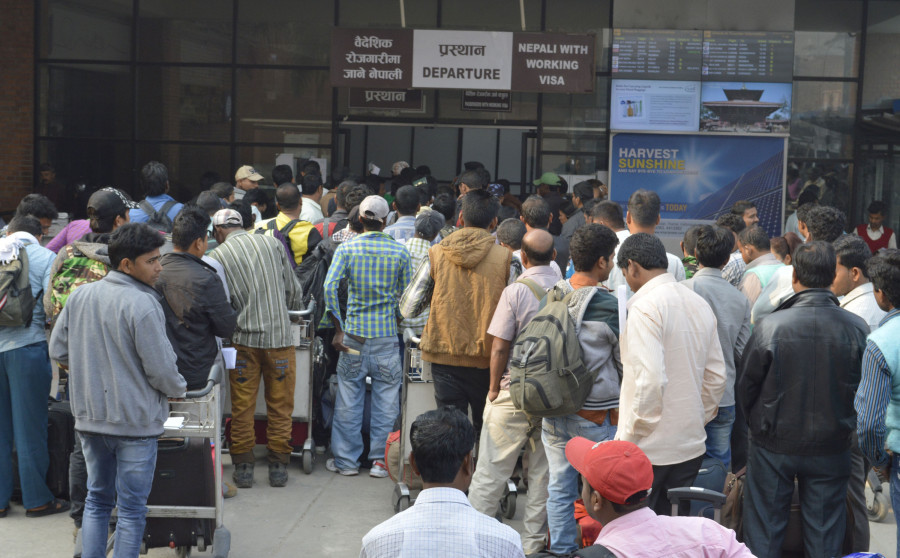National
Nepali mission resumes verifying workers’ demand for Saudi jobs after 10 months
Recruiting agencies cautiously welcome the resumption, fearing complicated processes might result in Nepali workers missing out on opportunities.
Chandan Kumar Mandal
The Nepali mission in Saudi Arabia has resumed its services to prospective Saudi employers who want to hire Nepali workers following a hiatus of 10 months—raising hopes for the revival of the labour migration sector hit hard by the Covid-19 pandemic.
The Nepali embassy in Saudi Arabia has resumed attesting demand letters submitted by local employers for hiring Nepali, the mission said. The embassy had stopped attesting the letters 10 months ago following the government’s decision to suspend recruitment of Nepali workers abroad due to the Covid-19 crisis.
“The resumption of services at the embassy has raised hope among recruiting agencies and workers. Halting the issuance of demand verification letters had impacted labour migration [in Saudi Arabia] when other embassies had already resumed the service,” said Sujeet Kumar Shrestha, general secretary at the Nepal Association of Foreign Employment Agencies (NAFEA), a grouping of 854 recruiting agencies that supply Nepali workers.
According to Shrestha, demand for around 50,000 to 60,000 workers is expected in the next month alone if everything goes smoothly.
The government had suspended migration of Nepali labourers after outbreaks of Covid-19 were reported in major destination countries. Following the decision, Nepali missions abroad had one after another stopped attesting labour demand letters. The embassy in Riyadh stopped issuing demand attestation letters on March 13.
Even when the government announced the resumption of the labour migration sector, the embassy in Saudi Arabia, a major destination for Nepali migrants, had not resumed its services.
Recruiting agencies had been complaining that the Nepali mission in Saudi Arabia should also resume the verification process, which is considered the first step towards hiring Nepali workers.
The embassy in Riyadh said that attestation of demand letters will be carried out online only. It has also developed a separate portal for prospective employers to submit their demand letters. The embassy has also come up with a specific format for prospective employers to follow while seeking approval from the mission for the hiring process.
Through a press release on January 10, the Nepal embassy in Riyadh had said the demand attestation would be started cautiously with limited numbers and expanded in a phase-wise manner, if necessary.
However, the association of recruiting agencies is not convinced that the new online procedure will work smoothly.
“Even days after the verification process resumed, workers’ demand documents have not been attested so far,” said Shrestha. “There are still issues with the overall process.”
According to Shrestha, big companies in Saudi Arabia prefer hiring workers through local agencies whereas existing rules say employers themselves need to submit an application to hire Nepali workers.
As per a 2018 directive, foreign employers who wish to hire Nepali workers, need to get approval from the Nepali foreign mission based in the country concerned. The rule was enforced to make the overall hiring process more transparent and minimise fraud.
“If some companies are problematic, they should be investigated. But bureaucratic hassles in the demand attestation process should be minimised,” said Shrestha. “More than 90 percent of demand applications from Saudi employers used to get approved in the past. But the number has come down to 20 in the past few years.”
Every year, tens of thousands of Nepali workers head to the Gulf kingdom for work. But the number of Nepalis going there has gone down in the past few years, following an economic slowdown and the introduction of a policy to reserve jobs for Saudi citizens. Last fiscal year, when the number of Nepali pursuing overseas dropped significantly, 83,163 Nepalis had gone to Saudi Arabia.
Recruiting agencies in Nepal fear the complicated process and further delays in approval of the demand letters might result in lost opportunities for Nepali migrant workers.
“Our workers also need jobs in labour destination countries such as Saudi Arabia,” said Shrestha. “What if they start hiring workers from other African countries, what will we do?”




 11.12°C Kathmandu
11.12°C Kathmandu















